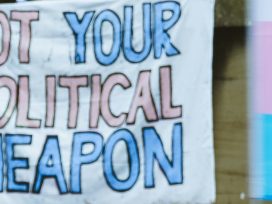The atmosphere in the House Chamber the night of the State of the Union speech was a little spooky.
A chair stood empty in honour of Gabby Giffords, a colleague who had been gunned down in front of a Tucson supermarket. Democrats and Republicans abandoned their usual seating plan, virtually holding hands in a sweet but silly display of solidarity; wags in the press dubbed it “Date Night”. The mood was subdued, tired – a pause in Congress’s endless partisan battle. Even the standing ovations, a part of every State of the Union address, were rather tentative; nobody could quite decide whether they were for or against what the President was saying.
It made sense, because Obama was trying to give a speech that was conciliatory rather than contentious. He spoke in favour of increased government support of private industry yet against excessive spending, against illegal immigration yet for the education of the children of illegal immigrants, for his own healthcare and financial regulatory bills yet critical of their flaws. The rhetoric he used was curiously old-fashioned – rhetoric about America doing “big things” and needing to seize the “Sputnik moment” to reclaim its place as No. 1 in the world. In these penny-pinching times – when, as he noted, American education is in decline and China is much better at financing research and development – his pep talk wasn’t totally convincing.
Embedded in Obama’s rhetoric were some fairly sweeping proposals. He suggested a revision of the tax code, streamlining federal agencies, and redirecting government oil subsidies to companies specializing in “clean” energy. Ordinarily, these sorts of proposals are hopeless. Special interest groups are waiting just outside the Congress doors to quash them. The government streamlining idea seemed especially far-fetched; as the President pointed out, America has a “messy” system that in some sense defines its version of democracy.
And yet Obama has a record of getting things done. Can he do what he did with the healthcare and financial regulatory bills – write legislation so long and complicated that most of the Congress doesn’t actually read it, and thus manage to make at least a few useful changes for the better? Of course this year he faces another problem: a Republican House of Representatives dedicated to undoing everything that he’s accomplished.
The most honest response of the evening came from a TV commentator who listened to the speech and the Republican follow-ups, and threw up his hands: “Obama wants to create jobs through government aid to industry, which is all well and good, but where’s the money coming from? The Republicans want to reduce the National Debt, which is also good, but which programs do they want to cut? It’s gonna be a tough year.”
Actually, it’s these very contradictions that define the State of the Union in early 2011. While the stock market goes up, the work force limps along at a 9.4% unemployment rate; while the government bailouts supplied banks and big corporations with mountains of extra cash, the National Debt is at $14 trillion, and rising.
Some of the more troubling economic news – information that never came up in the President’s speech – is that America’s states and cities are going broke. Back-to-back articles in the New York Times (“A Path Is Sought for States to Escape Their Debt Burdens”, 20/01; and “Mayors See No End to Hard Choices for Cities”, 21/01) described a near-crisis situation spreading coast to coast. A number of states and cities, beset with debt, can’t pay their bills. The articles cite a city in California filing a bankruptcy plan that pays its creditors as little as 5 cents on the dollar; a crime-ridden city in New Jersey laying off half its police force because it can’t afford to pay them; Obama’s home state, Illinois, taking the heretofore-unthinkable step of raising taxes by 66%.
Maybe the most ominous word in this scenario is “bankruptcy”, a peculiarly (though not exclusively) American way of starting over. When a business starts to fail, or an individual spends money so recklessly that he can’t pay his creditors, they can appeal to the courts to declare them bankrupt, and thus eliminate – or drastically reduce – their outstanding debts. While in many countries bankruptcy is considered a shameful and desperate last resort, Americans give it a positive spin – if at first you don’t succeed, try again.
Though New York City almost went bankrupt in the 1970s, bankruptcy rarely occurs in the public sector. In fact, states are prohibited by the Constitution from going bankrupt – and with good reason: if in the future a state needs to raise money for, say, bridge and road repair, who would lend it to them if they’ve already demonstrated how bad they are at managing money? To say nothing of the major negative consequence of state bankruptcy: public employee retirement funds, and salaries of thousands of state employees, will be decimated.
Yet state bankruptcy is exactly what’s being considered by both House and Senate Republicans, urged on by Newt Gingrich, one of the most powerful conservative voices and a potential Republican candidate in 2012. Apparently the movement has gained so much momentum that in the last two months $25 billion has been taken out of mutual funds that specialize in state and municipal bonds – and the salaries of federal and many state employees are frozen for the next year.
It’s an ugly situation. Though the public sector is hurting for money, public employees are the first to be punished, chiefly because they’re close at hand, and in many cases have no unions to protect them. The thornier problems behind the empty public coffers are never addressed.
So it wasn’t totally surprising that the audience listening to the President’s speech didn’t exactly know when to clap. While the President painted an optimistic picture of a future with government and industry hand in hand like some of the officials in the House Chamber (the President had just appointed the CEO of General Electric as the chairman of his economic advisers), people were also aware that the public infrastructure was teetering, and getting worse.
As the Times quoted the long-serving Mayor of Akron, Ohio: “It’s no fun anymore!”






